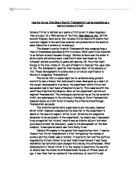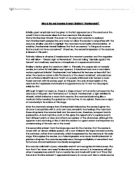Feminist critic Anne K. Mellor argues that Mary Shelley's Frankenstein is an attack on masculine Romanticism. To what extent do you agree with Mellor's assessment?
Feminist critic Anne K. Mellor argues that Mary Shelley's Frankenstein is an attack on masculine Romanticism. To what extent do you agree with Mellor's assessment?
I believe that Mary Shelley's Frankenstein is an attack on the masculine Romanticism, thus, meaning my agreement with Mellor's assessment. In Shelley’s novel, the ambitious Romantic hero, Victor Frankenstein, challenges the laws of nature by trying to dominate the role of the females. He attempts to do so by creating artificial life, however, his attempt to tamper with the "ever-varied powers of nature”, is then the cause for his “destruction”. One interpretation of the novel is that man must keep equilibrium between his ambitious “pursuit of knowledge” and “the tranquility of his domestic affections”, not allowing one aspect to “interfere” with another.
Shelley structures her novel in a way that Walton’s framing tale is used as a warning to the readers who can relate to masculine characteristics, telling them to tame their ambition before it’s too late. And through Frankenstein's narrative, Shelley hopes that the readers can "deduce an apt moral" being that over ambition corrupts.
The characteristics of a masculine Romantic hero consist of a dominative egocentric personality with huge ambitions to pursue revolutionary ideas. These characteristics are represented in the novel through Walton, and Frankenstein. Walton has ideas to "tread a land never before imprinted by the foot of man". He is also convinced that his "voyage" can give "all man kind to the last generation", an "inestimable benefit". Similarly, Frankenstein has ideas to challenge “the principle of life" and find out “how nature works in her hiding places”. Both characters have visionaries of bringing unrealistic revolutionary benefits to mankind, such as attempting to "render man invulnerable to any but a violent death", and discovering a “land of eternal light”. Shelley attacks masculine Romanticism by mocking the Romantic male, conveying the point to the readers being that masculine ambition is normally based on emotional judgments, and trying to archive unrealistic objections that are generally “greater than their nature would allow ". Such behavior is a product of the Romantic male's egoistic attitudes. Frankenstein and Walton’s attitudes may have been inspired by the Romantic males that Shelley knew, such as her husband, Percy Shelley, and the Romantic-period scientist, Humphry Davy, who were said to be egoistic and arrogant.







